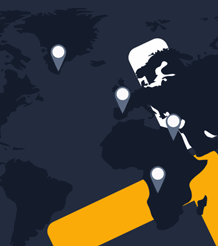
Guide to Property in Bulgaria
Property in Bulgaria has grown in popularity in recent years and many families are looking to Bulgaria to purchase more for their money than elsewhere in Europe. Nowadays investors are ever more interested in buying property in the capital city of Sofia, while prices remain low and the market gathers momentum.
Propertyshowrooms.com and Property In Bulgaria
We are delighted to offer you property in Bulgaria, one of the most profitable property markets in the world today.
With its recent membership of the EU in 2007 following drastic economic reform by the government to bring it up to required standards, Bulgaria certainly offers a promising future to today’s investors. Construction work is now well underway in the the capital, Sofia, offering fantastic investment opportunity property purchasers seeking to supply a strong demand for tourist and residential real estate.
Since its break with Communism, the country has made a brilliant recovery and has invested heavily in the economy and general country infrastructure in order to bring it up to full European standards. Today property in Bulgaria offers property purchasers a solid investment within a sound economic and political structure. Many buyers are snapping up quality property in Sofia where prices remain low for now but are set to soar as a result of the introduction of vital new EU and international business activity in the capital.
It is important to work with a well established agent who will guide you through each step of the property buying process. Below is a general summary of the buying procedure for property in Bulgaria:
Using an Agent
Propertyshowrooms.com can provide you with a wide selection of properties for sale from our database. We will also recommend a good lawyer who speaks your language fluently and take you through all the legalities, some of which are different to those in the UK or other countries. If we cannot immediately offer you your ideal property, we will do our best to source it for you using our network of partners.
Making an Offer
When you have decided on a property in Bulgaria you will need to make a verbal offer through your agent for acceptance by the vendor. Once this is done, negotiations will proceed. At this stage a lawyer should be appointed by you to formalise the agreement.
Appointing a Lawyer
It is wise to appoint a lawyer who is fluent in your language so that you fully understand all the legalities and proceedings. Our agents will gladly recommend a good lawyer in Bulgaria who will carry out all the necessary checks on the property and complete the legal requirements of the sale.
The Purchase
First of all, the buyer should sign a preliminary contract for the purchase of the estate and pay the owner a sum of 10% of the total purchase price as a down- payment. Usually these contracts are signed while the owners prepare themselves with the necessary documents for the signing of the Title Deed before a Public Notary.
After a certain period of time (usually one month), the buyer pays the remaining 90% of the purchase price and obtains a Title Deed for the ownership of the property.
Property Purchase Expenses in Bulgaria
2% State Tax - similar to a stamp duty and calculated on the purchase price. Notary Fee - calculated in accordance with the price stated in the Title Deed. Expect to pay approx. €350.00 on a typical 2 bed apartment. Land Registry - 0.1% of the value. Legal fees - expect to pay 1% of property value in most cases.
An Example:
If the property costs €50,000, all fees (excluding legal fees) would amount to nearly €1,300. For a deal where the property costs €100,000, fees would be around €2,400, and for a property valued at €200,000 they would total around €4,500. Traditionally these costs were split 50/50 by Bulgarians, however nowadays it is a subject of agreement between the vendor and the buyer.
Factors to be Aware of
In order to avoid paying excessive amounts of Capital Gains Tax (which can amount to as much as 30% of the real purchase price), it is likely that the current owner of the property will not want to declare the real price of the property on the Deed of Transfer. The Title Deeds will therefore display a lower figure than the actual price you paid for the property. This situation will have its financial consequences, such as not having official documents for the real money you spent plus liability for higher taxes if you decide to sell the property afterwards and declare its real value. You will need to consult your broker/lawyer on this and all aspects of the deal to avoid any eventual misinterpretations or oversights.
Financial Services and Mortgages
In keeping with its entry into the EU, the banking system in Bulgaria has done a lot to reform itself over the past years, becoming more open and transparent. As in any country, if you open a bank account in one of Bulgaria's banks, you should compare commission rates for money transfer to and from Bulgaria. In most Bulgarian banks you will find a few English-speaking employees to help you, probably in the foreign exchange department.
Outside of the major cities and tourist areas, Bulgaria is largely a cash economy although ATMs are attached to most banks. In recent years the practice of using debit cards has become more widespread, although payment with personal cheques is practically unknown and little used as a method of payment. However, payment by debit cards is accepted in some of the retail chains and gas stations and is increasing in popularity. Foreigners are the main users of cheques and credit cards.
The Association of Commerce Banks is a body that represents all recognized financial institutions in Bulgaria, and as such acts as a bond of reputability. The full list of Bulgarian ACB member Banks is listed below: Bulbank Biochim Central Cooperative Bank Economic & Investment Bank Demirbank Encouragement Bank Eurobank ING Bank First Investment Bank Roseximbank Expressbank Societe Generale Union Bank United Bulgarian Bank Bank DSK Procredit Bank Tokuda Bank Plc
Currency
EURO
Current Interest Rate
7.5%, variable
Loan to Value
Up to 70% of the valuation price
Term
5-15 years
Minimum Amount
EUR 40,000 - No maximum (Generally)
Status
Full status only
Arrangement Fee
Approx 1%
Building Insurance
Fire, flood and earthquake
Contents Insurance
Recommended
Life Insurance
Not required
Fees
Borrower subject to legal fees, costs, as well as admin and valuation fees. In addition, the maximum Notary fee ever payable is €1,500.
Repayment Type
Capital repayment
Loan Amount
Up to 80% of purchase price or valuation (whichever is lower)
Term
15 years
Interest Rate
6.2 – 9.5%
Building & Contents Insurance
€200 (required annually)
Arrangement Fee
€500 (1% of loan amount)
Application Fee
€100
Legal Fees
€2,000 (Approximation)
Notary Registration Fee
€300
Monthly Payment
€299.00 (€53,750.00 over 180 months) *
Initial Costs
€3,100.00 (including insurance)
Annual Costs
€200.00 (insurance) ** * Changes in the exchange and interest rates may increase the monthly repayments and the sterling equivalent of your debt. Examples calculated to nearest round number. ** Annual costs do not include maintenance, tax and other fees incurred on your property outside the mortgage agreement structure.
Loan Security
Agreement subject to pledge over company's assets (for company loans) and personal guarantees of beneficial owners (for company loans).
Repayment Method
Capital plus interest, in equal monthly installments.
Early Repayment
For early repayment of a mortgage within 3 years of completion, you must expect a fee to be charged. This fee will be approximately 3% in the first year following completion, 2% in year 2 and 1% in year 3 of the outstanding balance of loan.
Case Study
It must be noted that the example below is for indication purposes only. A full illustration can be provided by the financier at application stage. Figures are also a guideline only, as can vary between lenders.
Repayment Type
Capital repayment
Loan Amount
Up to 80% of purchase price or valuation (whichever is lower)
Term
15 years
Interest Rate
6.2 – 9.5%
Building & Contents Insurance
€200 (required annually)
Arrangement Fee
€500 (1% of loan amount)
Application Fee
€100
Legal Fees
€2,000 (Approximation)
Notary Registration Fee
€300
Monthly Payment
€299.00 (€53,750.00 over 180 months) *
Initial Costs
€3,100.00 (including insurance)
Annual Costs
€200.00 (insurance) ** * Changes in the exchange and interest rates may increase the monthly repayments and the sterling equivalent of your debt. Examples calculated to nearest round number. ** Annual costs do not include maintenance, tax and other fees incurred on your property outside the mortgage agreement structure.
Recommended Documents
- For Proof of Income:
- Copy of your passport(s)
- Last 3 months pay slips
- Last P60 and letter from employer confirming annual salary and length of service
- Bank reference letter
- 3 months bank statements
- Breakdown of assets and liabilities and monthly commitment to borrowings
- Self-Employed borrowers:
- Previous years tax return
- Last 3 years accounts
- Letter from accountant confirming your profit figure and taxes as up to date
- Proof of income is required in all cases and can be made up of earned income, pension, investment or rental income. Please note however, the lender will not always take all or part of this income into account when determining the maximum loan available.
- Non-status / self-certificated or limited proof of income loans are currently not available.
How Your Loan is Calculated
Your loan is based on your joint net income and is calculated on an affordability basis. All your existing liabilities, including any mortgage/rent payments, personal and bank loans, credit card payments (if the balance is not cleared on a monthly basis) and any maintenance payments together with your proposed Bulgarian mortgage payments must not exceed 40% of your net monthly income (Example: Net joint monthly income £2,500 x 40% of that figure is £1,000 minus existing monthly mortgage payment £300 - No other liabilities. This leaves a balance of £700 for a proposed Bulgarian mortgage payment).
Company Ownership of Land
In Bulgaria, although a foreign legal entity (Ltd, joint stock company etc) is entitled to own titles of land, a foreign person is not. However, a foreign person may have full rights on a building, as he/she may own title of a building without owning the underlying land.
If applying for a loan to a Bulgarian Company of which you are the beneficial owner, you will be required to guarantee the loan. The Lender will expect you to receive independent legal advice from a solicitor in the UK concerning the guarantee and confirmation from the solicitors that they have indeed advised you independently (both documents included within the Guarantee). Be aware that the Lawyer/Notary may be incorporating, within his charges, costs for assigning the mortgage and you should establish with the Lawyer and/or Notary the actual cost before proceeding with the loan application.
Other Procedures
You must ensure you have the full title to the property upon completion and the appropriate documents must be available for your lender. Finance will be granted only for completed apartments where the State Acceptance Commission has issued a valid “Use Permission Certificate”.
You may choose to use the lender’s solicitor in Bulgaria as your own representative. If this is the case, you will need to specify this in the mortgage application. Your relationship with the solicitor will be totally separate from that of the lender and the solicitor.
The completion of a Bulgarian mortgage takes place in front of an appointed Bulgarian Notary officer and all representatives of the parties to the mortgage need to be present. A power of attorney will need to be presented to the lender in good time before completion – a draft document will be provided by the lender.
If you intend to be present at the completion to sign all the relevant documents and you do not understand the Bulgarian language, a translator will be required to respond to the Notary. The translator will also be required to sign the notary deed.
Can Foreign Nationals Own Property in Bulgaria?
Yes, foreign nationals are free to own as much property in Bulgaria as they wish, without restrictions. However, if you purchase land, you are currently required to incorporate a business in Bulgaria and own the land as an asset of the company.
Why Should I Choose Bulgaria?
Bulgaria is ideally situated in Southeastern Europe and is easily accessed by direct flights from most European airports.
Bulgaria has something for everyone. A warm climate entices year-round tourism, along with a wide range of cultural and historical interests for sightseeing. Bulgaria also boasts a rich variety of natural beauty, from stunning blue flag Black Sea beaches, to beautiful mountains with ski resorts. It is small wonder that Bulgaria is the fastest growing holiday destination in the world. Major tour operators such as Thompson and First Choice now include Bulgaria in their brochures and cite it as one of their top sellers.
Investment wise, high growth figures are very achievable while land and property prices are on the increase. Over the past two years, prices have risen by over 50% in some areas and with the enormous boost to tourism currently underway, buy-to-let purchases are also proving highly lucrative.
So Bulgaria now offers some of the best investment opportunities available worldwide and, with economic growth predicted by the World Bank to be 6% by the end of 2006 and EU membership set for January 2007, Bulgaria is a wise choice for property investment.
What is the Economic and Political Situation?
Bulgaria's socialist party has taken drastic and speedy measures to qualify its infrastructures for accession to the European Union in 2007.
Today GDP stands at an encouraging 5.5 per cent and the international community now views Bulgaria in a very favourable economic light. Efforts to reduce inflation have succeeded (currently around 0 per cent) and privatisation plans are being driven forward at a great pace. The World Bank director for Bulgaria & Romania has claimed Bulgaria as “a good place for investment”, highlighting the fact that in just 3 years, the country has risen from being the World Bank's lowest rated country in this Eastern region, to being the highest.
Today, foreign investors are focusing their attention on some of the very exciting real estate prices still on offer in Bulgaria as investments in the right locations are fetching high capital returns. An enormous increase in tourism has helped create a healthy economy in Bulgaria and prompted many foreigners to invest here.
How do we Travel to Bulgaria?
Bulgaria is only a short 2 ½ to 3 hour flight from the UK and other European locations. Direct scheduled flights with British Airways and Bulgarian Air operate to Sofia all year round. Direct Charter flights to Varna and Burgas on the Black Sea coast run from April to October.
Flights arrive at one of four international airports: Sofia (SOF), the largest of the airports, Varna (VAR), Ploudiv (PDV) for charter flights to the ski resort of Pomparovo, and Burgas (BOJ) for domestic flights and for summer charter flights to the Black Sea resorts.
UK Airports Offering Flights to Bulgaria: London - Gatwick, Heathrow, Luton, Stansted South West and Wales – Bristol, Cardiff, Exeter South and South East - Southampton Midlands – Birmingham, East Midlands East Anglia - Norwich Northeast - Durham Tees Valley airport, Humberside, Newcastle Northwest – Blackpool, Liverpool Yorkshire - Leeds/Bradford Scotland – Aberdeen, Edinburgh, Glasgow, Prestwick Northern Ireland - Belfast International
What is the Direct Flying Time from the UK to Bulgaria?
Only a short flight from the UK, (2 ½ to 3 hours), Bulgria is easily accessible and has connections from many UK airports.
Flights to Bulgaria arrive at one of four international airports: Sofia (SOF), the largest of the airports, Varna (VAR), Ploudiv (PDV) for charter flights to the ski resort of Pomparovo, and Burgas (BOJ) for domestic flights and for summer charter flights to the Black Sea resorts.
Is a Visa Required to Enter Bulgaria?
Holders of valid ordinary passports from the following countries do not need a visa to visit Bulgaria for up to 90 days within each period of six months:
Andorra, Argentina, Australia, Austria, Belgium,Brazil, Brunei,Canada, Chile, Costa Rica,Croatia,Cyprus, Czech Republic, Denmark, El Salvador, Estonia, Finland, France, Germany, Greece, Guatemala, Honduras, Hungary, Iceland, Ireland, Italy, Israel, Japan, Latvia, Liechtenstein, Lithuania,Luxembourg, Malaysia,Malta,Mexico,
Monaco, Netherlands, New Zealand, Nicaragua, Norway, Panama, Poland, Рortugal, Paraguay, Republic of Korea, Romania, San Marino, Slovak Republic, Slovenia, Spain, Sweden, Switzerland, Singapore, UK (British Citizen Passport Holders and British Nationals/Overseas/ only), USA,Uruguay, the Vatican, Venezuela, SAR – China (Hong Kong, Makao)
All passport holders from countries not mentioned in the list above need to obtain visas to enter Bulgaria.
Visa applications are usually processed for a period of up to 10 working days as each application needs to receive clearance by the Bulgarian Foreign Ministry in Sofia.
Foreign nationals entering Bulgarian territory on a private car or motorbike need to present a document of ownership.
All foreign visitors should bear aware that, under Bulgarian Law, they are required to contact the local police station within 48 hours of their arrival in Bulgaria and present in writing the address at which they are staying. If they are staying in a hotel or private lodgings, the hotel management/host are obliged to register them at the local police station.



